Postgraduates get hard lessons at job fair
Updated: 2013-12-14 00:53
By Sun Xiaochen (China Daily)
|
||||||||
Many jobseekers being rejected due to high salary requests: employers.
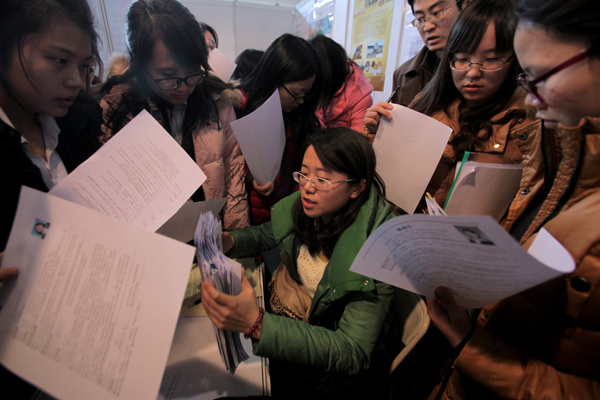 |
|
A recruiter is surrounded by employment seekers at a job fair for postgraduates in Beijing on Friday.[WANG JING / CHINA DAILY] |
"It's too hard to find a job," Zuo told China Daily at an employment fair mainly for postgraduates on Friday. "Spending two more years in graduate school, we thought we could get the edge to ask for a high-paying job, but it turns out we were overly optimistic."
As of Friday, the 25-year-old had handed out more than 150 resumes at three job fairs since September but hadn't found a suitable job.
At Friday's crowded job fair, Zuo was among some 36,000 students discovering that their master's degrees weren't bringing them the offers they had expected in the toughest employment year in a long time.
According to the Ministry of Education, a record number of 7.27 million students will graduate from colleges across China next year, 280,000 more than the number this year.
The number of postgraduate students also keeps growing. In Beijing alone, about 79,000 master's degree holders will flood the job market next year, 7,000 more than this year, according to the Beijing Municipal Bureau of Human Resources and Social Security.
At the job fair on Friday, more than 750 employers received 148,000 resumes while offering only 9,500 opportunities for job interviews, according to its organizing committee.
However, employers anticipated a high rejection rate during the interview process, citing students' excessively high salary expectations.
Ma Zhaohui, the recruitment manager of Beijing Join-Cheer Software Development Co Ltd, said graduates' focus on salaries would repel potential employers despite their elite academic performance or practical experience.
"If they hadn't started by naming a figure, the company might have offered them good pay. In fact, most recruiters could afford the amount the candidates asked for," Ma said.
"But they have to earn it by proving their ability."
Li Lingli, a recruiting official from the Beijing Performance & Art Group Co Ltd, made similar comments, stressing that employers won't hesitate to lure talent with lucrative offers if they feel they are really worth the money.
According to the Chinese College Graduates' Employment Annual Report, the average monthly wage of a postgraduate's first job was 4,500 yuan ($740) in 2012, while more than 52 percent of respondents expected it to be at least 6,000 yuan, said a recent survey published on education portal eol.cn.
Some graduates, however, are prepared to accept reality.
Xie Fenghao, who studied political education at Tianjin Normal University, said he was looking to land an entry-level job as a springboard to a better one in the future.
Experts agreed that was a smart move.
Xiong Bingqi, vice-president of 21st Century Education Research Institute, said he encourages graduates to better their positions by starting out with low-profile jobs.
"The priority is to find a job, not to find the best or most comfortable one, which is actually impossible," said Xiong.
"By lowering their job expectations," he said, "postgraduates will find it easier to start their careers and eventually reach the place they would like to be".

 Two students wounded in US school shooting
Two students wounded in US school shooting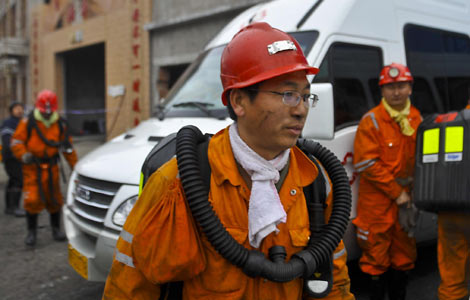
 21 died in Xinjiang coal mine explosion
21 died in Xinjiang coal mine explosion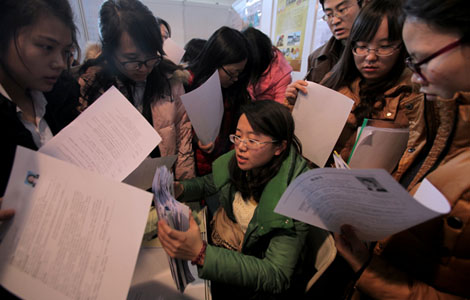
 Postgraduates get hard lessons at job fair
Postgraduates get hard lessons at job fair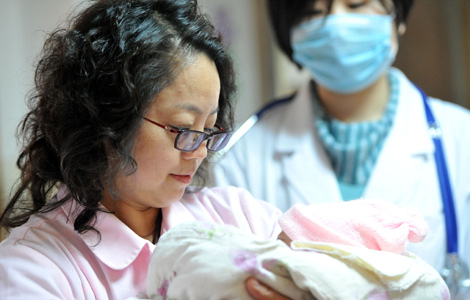
 Havens of hope open their arms to forsaken infants
Havens of hope open their arms to forsaken infants
 New Sanlu seeks to shake off image tainted by scandal
New Sanlu seeks to shake off image tainted by scandal
 Golden statue to mark anniversary of Mao's birth
Golden statue to mark anniversary of Mao's birth
 Selfies of the year 2013
Selfies of the year 2013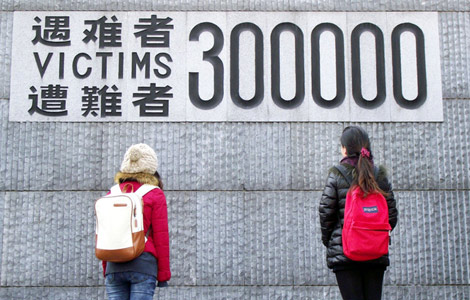
 Massacre victims remembered in Nanjing
Massacre victims remembered in Nanjing
Most Viewed
Editor's Picks

|

|

|

|

|

|
Today's Top News
US paves way for in-flight cell phones
ASEAN cautious on air zone debate
Top leaders vow to steer steady path
BYD dismisses 'inaccurate and misleading' reports
Execution may hit co-op projects
Two wounded in US school shooting
Gift ban applies to festivals: official
UPS to deliver more parcels in China
US Weekly

|

|






